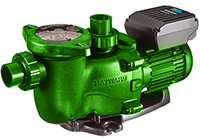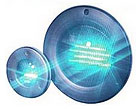FREE Standard Shipping On All Orders $100 or More!*
Energy Efficient Pool Equipment
Today, we look at the most energy efficient pool equipment across five categories - pumps, filters, heaters, cleaners, and underwater pool lights.
One or more of these may have their hands in the cookie jar - and could be costing you more money than you may think!
 Most Energy Efficient Pool Pumps
Most Energy Efficient Pool Pumps
Straight-up, the pool pump can be the largest energy hog on the pool equipment pad. Actual energy use depends on the horsepower of the motor, and how many hours the pump runs each day. Actual energy cost depends on your cost per kilowatt hour (kWh).
Calculating Pool Pump Energy Use: Each horsepower uses 746 watts. For a 1.5 hp pool pump, multiply 746 watts by 1.5 hp, for a total of 1,119 watts. Most utilities charge from 10¢ to 15¢ per kilowatt-hour, and to know kilowatt-hours, multiply watts X hours and divide by 1,000. For example, if a 1.5 hp pump runs 12 hrs per day: 1,119 multiplied by 12 and divided by 1,000 equals 13.5 kWh per day. Multiplied by 30 days, pump energy use equals 403 kWh per month.
Smaller Pool Pumps: Ergo, the most energy efficient pool pump is a smaller pool pump, or one with lower horsepower. Also good to know is that different pumps have different flow rates. High flow pumps such as Pentair Whisperflo or Hayward Tristar can produce the same flow rates as medium flow pumps such as Pentair Superflo or Hayward Superpump, at half the horsepower. Switching from a medium flow pump to a high flow pump of a lower horsepower, is one way to cut your energy use - by as much as 50%.

Variable Speed Pool Pumps: Another way to reduce pump energy use even more, up to 80% less - is to run the pump at lower speeds. Standard motors operate at 3450 RPM, all the time. Variable Speed pumps allow you to run the pump at lower speeds, as low as 750 RPM, which can use up to 8x less energy to operate.
Two Speed Pool Pumps: The same idea as with variable speed pumps, which commonly have 3 or more speeds, two-speed pumps like Hayward Superpump or PowerFlo Matrix operate on high speed a few hours per day, and run at low speed for the remainder of the day. Low speed of 1725 RPM runs at half-speed, but draws 8x fewer amps - and amperage use is really what you pay for each month.
Energy Efficient Pump Motors: Replacing a standard efficiency pump motor with energy efficient pump motors will also reduce amperage consumption, by as much as 20%. If my other ideas above don't appeal to you, an EE motor may be just the thing!
 Most Energy Efficient Pool Filters
Most Energy Efficient Pool Filters

What is this, a trick question? Everyone knows that pool filters are not powered by fuel or electricity, so how can a pool filter save energy? It has to do with back-pressure or restriction to flow. Large pool filters will have lower operating pressure, and this requires less work for the pool pump.
And, the largest restriction of a pool filter is not usually the filter media (sand, cartridges or DE grids), but a multiport valve. Multiport valves add a lot of back-pressure to the system, much more than slide valves (aka push-pull valves), and much more than filters without a valve.
Which filters don't have a backwash valve? Cartridge pool filters - don't use a backwash valve because they are not backwashed, but opened up for cleaning. This makes the Cartridge pool filter the most energy efficient filter. And they save water, also because they are not backwashed, which uses hundreds of gallons of water.
 Most Energy Efficient Pool Heaters
Most Energy Efficient Pool Heaters
Pool heater manufacturers are quick to point out their gains in energy efficiency, and like pool pumps, pool heater energy standards are mandated in many states.
Gas Heaters: gas pool heaters are 82% efficient for Cupro-Nickel and 84% efficient for Copper heat exchangers, for both propane and natural gas heaters. One heater brand stands out above the rest, the Lochinvar Energyrite pool heater can reach efficiency ratings of up to 88%. Efficiency is measured by heat input divided by heat output, meaning gas heaters can lose nearly 20% of energy.

Heat Pumps: the most energy efficient pool heaters are electric pool heat pumps. They use much more electricity than gas heaters, but don't require any fossil fuels, and are actually more than 100% efficient. In other words, they produce more heat output than their energy input, up to 4x more. The highest efficiency heat pumps use scroll compressors and have a higher COP (coefficient of performance).
Solar Heaters: what's even more energy efficient than a pool heat pump? Solar pool heaters have no gas or electric hook-up at all, and only indirectly use energy to run the pool pump, which you are presumably doing anyway.
 Most Energy Efficient Pool Cleaners
Most Energy Efficient Pool Cleaners
Pressure cleaners are those that require a booster pump to operate the cleaner, and using a timeclock, the pump will turn the cleaner on/off each day for a few hours. Running an additional pool pump, even just a 3/4 hp booster pump, makes pressure cleaners the least energy efficient pool cleaners available. Even though they are usually the most effective and most automatic of pool cleaners, they are not the most efficient.

Robotic cleaners are also electrically powered, but use a transformer to reduce voltage from a standard 115V outlet, which requires much less amperage than a booster pump. As an added bonus, robotic pool cleaners also filter the pool water as they vacuum, which may reduce the amount of needed filtration time each day, saving some pump energy.
Suction cleaners require no additional power hook-up at all, but operate on the suction pressure provided by running the pool pump, which you are presumably doing anyway. This could make suction pool cleaners the most efficient pool cleaners, even if they aren't always the most effective.
 Most Energy Efficient Pool Lights
Most Energy Efficient Pool Lights
Like most other pool equipment categories, there are also 3 types of underwater pool lights, Halogen, Incandescent and LED. I'll bet you already know which of those three is the most energy efficient - LED pool lights.

Older in-ground pool lights can be replaced with super-cool LED color pool lights to save up to 70% in energy, and add some pizazz to your old pool. Or keep the old lamp, and just replace the flood style bulb with a plug 'n play LED replacement bulb, made by Pentair and J&J electronics, and reduce watt consumption from 500 watts to just 14 watts!
When your old pool equipment is ready for replacement, look to these examples as effective and efficient pool equipment that you can install yourself. Keep those hands out of the cookie jar - and out of your wallet!